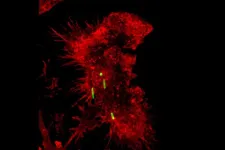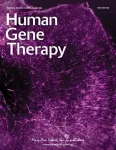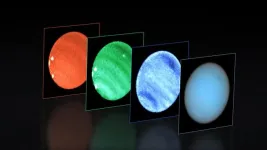(Press-News.org) Inflammation is a standard part of our bodies’ immune system response. But sometimes this response becomes hyperactivated in our lungs, causing inflammation to continue unchecked, which can be fatal. Many deaths from COVID-19 have been due to excessive inflammation, which results in acute lung injury.
A group of researchers at the University of Illinois Chicago have investigated how lungs counterbalance inflammation. Their work points to cells in the lung that reduce inflammation by removing cellular debris, ingesting harmful bacteria and releasing anti-inflammatory proteins. What’s more, these cells can be trained by an initial infection to do this job even better during a subsequent infection.
The scientists demonstrated that injecting these trained cells into mice helped keep them alive after an infection with pneumonia. These results suggest that such trained cells could become part of a cell therapy that prevents excessive inflammation. The research is published in the Journal of Experimental Medicine.
The researchers found that after an initial exposure to a bacterial toxin, lung immune cells called alveolar macrophages helped reduce the severity of inflammation brought on by a second exposure to the bacterial toxin one week later. The benefit of this “memory” or “training” was present even when the second exposure occurred a month later, explained senior author Dr. Jalees Rehman, Benjamin Goldberg Professor and head of the UIC Department of Biochemistry and Molecular Genetics.
The cells appear to become particularly good at removing post-infection debris — such as cellular debris from immune cells that fought the infection or from one’s damaged tissue — Rehman explained. “Clearing out this debris is important because its persistence can trigger the immune system to continue to react, thus increasing inflammation,” Rehman said. Because this debris isn’t specific to one type of infection, these trained macrophages might help reduce the risk of acute lung injury from subsequent infections that arise from a different disease. The researchers found that the molecules involved in the removal of cell debris were higher in the trained alveolar macrophages.
Alveolar macrophages are unusual cells in that we are born with them and they stay in our lungs into adulthood. During infections, alveolar macrophages die but they can regenerate from surviving alveolar macrophages. They also pass along epigenetic information to their cellular progeny, which means new macrophages could retain a memory of previous infections, Rehman explained. All of this combines to make them very effective in helping to reduce acute lung injury.
Many other organs have macrophages, so future research could explore whether those cells could be trained by an initial infection as well or by directly increasing the levels of the molecules that help with debris removal, said Rehman, who is also a member of the University of Illinois Cancer Center.
The other authors on the study are Sreeparna Chakraborty, Abhalaxmi Singh, Li Wang, Xinge Wang, Mark A. Sanborn, Zijing Ye, Mark Maienschein-Cline, Amitabha Mukhopadhyay, Balaji Ganesh, and Asrar B. Malik, all from UIC’s College of Medicine.
Written by Emily Stone
END
Training immune cells to remove ‘trash’ helps resolve lung inflammation
2023-08-24
ELSE PRESS RELEASES FROM THIS DATE:
A new pathway to regenerate myelin discovered
2023-08-24
A study led by Dr. Hyun Kyoung Lee, associate professor at Baylor College of Medicine and investigator at the Jan and Dan Duncan Neurological Research Institute at Texas Children’s Hospital, has discovered a new biological mechanism to regenerate and repair myelin, a protective sheath that insulates neuronal fibers and plays a vital role in ensuring rapid and accurate neurotransmission. The Duncan NRI team found novel roles for the Dishevelled associated activator of morphogenesis 2 (Daam2) protein and CK2α kinase in regulating myelin repair and regeneration. The study was published in the Proceedings of the National ...
Monell Center helps discover epigenetic mechanism that causes bitter taste distortion
2023-08-24
PHILADELPHIA (August 24, 2023) – A bitter taste in the mouth is often a symptom or side effect of illness, which may be the result of how the body reacts to pathogens. A new study published in iScience, by Hong Wang, PhD, an Associate Member at the Monell Chemical Sense Center, and colleagues sheds light on the mechanisms involved in the complex interplay between taste perception and immune function. Their work also highlights the potential of a sequencing tool for investigating epigenetic mechanisms that affect taste-cell gene expression. Epigenetics is the study of how and when genes are expressed rather than alteration of the genetic ...
Gene therapy targeting the brain vasculature
2023-08-24
Researchers have developed an engineered adeno-associated virus (AAV) vector that yields high transduction of brain vascular pericytes and smooth muscle cells. The study describing the characterization of this novel AAV capsid is published in the peer-reviewed journal Human Gene Therapy. Click here to read the article now.
In the current study, Servio Ramirez, from Temple University School of Medicine, Patricia Musolino, from Massachusetts General Hospital, and Casey Maguire, from Harvard Medical School, and coauthors, characterize AAV-PR, the capsid that demonstrated high transduction of the brain vasculature. AAV-PR offers the ...
Overlooked part of brain could play critical role in addiction recovery
2023-08-24
INDIANAPOLIS—Researchers from Indiana University School of Medicine have discovered a neglected brain region that could play a critical role in how likely a person with drug use disorders is to relapse, even after a long withdrawal period. Their findings were published recently in Biological Psychiatry.
“Past studies in the field of addiction research have focused on the medial prefrontal cortex, which is the part of the brain that controls decision making, but no effective prevention or treatment for drug relapse is available,” said Yao-Ying Ma, MD, PhD, associate professor of pharmacology ...
Metabolite in urine predicts diabetic kidney failure 5-10 years early; oral therapeutic drug shows promise in mice
2023-08-24
SAN ANTONIO (Aug. 24, 2023) — Urine levels of adenine, a metabolite produced in the kidney, are predictive and a causative biomarker of looming progressive kidney failure in patients with diabetes, a finding that could lead to earlier diagnosis and intervention, researchers from The University of Texas Health Science Center at San Antonio (also called UT Health San Antonio) reported Aug. 24 in the Journal of Clinical Investigation.
Elevated adenine was also associated with all-cause mortality.
The study results are significant because until now, the most important ...
Math enables blending hydrogen in natural gas pipelines
2023-08-24
LOS ALAMOS, N.M., Aug. 23, 2023 — Mathematical modeling can show how to safely blend hydrogen with natural gas for transport in existing pipeline systems. A secure and reliable transition to hydrogen is one of the proposed solutions for the shift to a net-zero-carbon economy.
“Mixing hydrogen into a natural gas pipeline changes how the gases flow, which will create new conditions for operators,” said Anatoly Zlotnik, a co-author of a new paper on the modeling in the journal PRX Energy. ...
AI: ChatGPT can outperform university students at writing assignments
2023-08-24
ChatGPT may match or even exceed the average grade of university students when answering assessment questions across a range of subjects including computer science, political studies, engineering, and psychology, reports a paper published in Scientific Reports. The research also found that almost three-quarters of students surveyed would use ChatGPT to help with their assignments, despite many educators considering its use to be plagiarism.
To investigate how ChatGPT performed when writing university assessments compared to students, Talal Rahwan and Yasir Zaki invited faculty members who taught32 different courses at ...
Climate change: Emperor penguin breeding fails due to Antarctic sea ice loss
2023-08-24
Four out of five emperor penguin colonies in the Bellingshausen Sea, Antarctica, saw no chicks survive to fledge successfully in the spring of 2022, reports a study published in Communications Earth & Environment. The study suggests that this complete breeding failure is a direct consequence of the unprecedented loss of sea ice recorded in the region in recent years due to climate change.
Emperor penguin (Aptenodytes forsteri) colonies generally need stable ice attached to the land between April and January to ensure successful breeding and moulting. Any change in the extent of the Antarctic sea ice can affect their ...
Mysterious Neptune dark spot detected from Earth for the first time
2023-08-24
Using ESO’s Very Large Telescope (VLT), astronomers have observed a large dark spot in Neptune’s atmosphere, with an unexpected smaller bright spot adjacent to it. This is the first time a dark spot on the planet has ever been observed with a telescope on Earth. These occasional features in the blue background of Neptune’s atmosphere are a mystery to astronomers, and the new results provide further clues as to their nature and origin.
Large spots are common features in the atmospheres of giant planets, the most famous being Jupiter’s Great Red Spot. On Neptune, a dark spot was first discovered by NASA’s Voyager 2 in ...
Loss of Antarctic sea ice causes catastrophic breeding failure for emperor penguins
2023-08-24
Emperor penguin colonies experienced unprecedented breeding failure in a region of Antarctica where there was total sea ice loss in 2022. The discovery supports predictions that over 90% of emperor penguin colonies will be quasi-extinct by the end of the century, based on current global warming trends.
In a new study published today in Communications Earth & Environment, researchers from British Antarctic Survey discussed the high probability that no chicks had survived from four of the five known emperor penguin colonies in the central and eastern Bellingshausen Sea. The scientists examined ...


